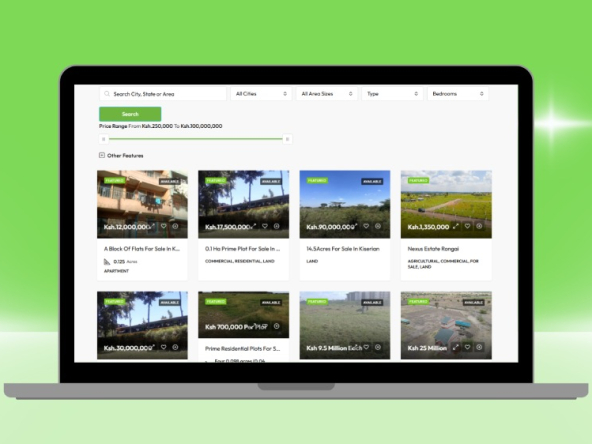Are you struggling to get buyer attention on your property listing? It all starts with the title. Craft a scroll-stopping title and turn passive browsers into active buyers, fast.
Key Takeaways
- Be Specific: Always state the property type and exact location.
- Use Keywords: Include searchable terms like “gated community” or “ready title.”
- Create Urgency: Add phrases like “selling fast” only when truly applicable.
- Stay Concise: Short, punchy titles outperform long-winded ones.
- Highlight Uniqueness: Mention standout features like affordability or investment potential.
- Follow a Winning Formula: Property Type + Location + Unique Selling Point (+ Urgency).
📝 Writing a Compelling Property Listing Title
- 📌 Why the Title of Your Property Listing Matters
- 🏠 Be Clear About the Property Type
- 📍 Include the Specific Location
- 🌟 Showcase the Unique Selling Point (USP)
- ⏳ Use Action-Oriented, Urgency-Driven Words
- ✂️ Keep It Short and Straight to the Point
- 🔍 Use Keywords That Improve Searchability
- 📐 Final Formula for the Perfect Property Listing Title
- 📈 Optimize for Mobile Viewing
- 💬 Use Conversational Language for a Human Touch
- 🧠 Avoid Common Title Mistakes
- 🧪 A/B Test Your Titles to See What Works
- 📦 Bundle Listings With Variations to Cover More Searches
- 🏁 Conclusion: Turn Your Titles into Click Magnets
Your title is your first impression. It’s the hook that either pulls in potential buyers or gets lost in the noise. And in today’s digital real estate world, attention is currency. Buyers scroll fast and scan faster. You’ve got one shot to capture their interest—and it starts with just a few carefully chosen words.
Let’s break down the anatomy of a killer property title. From clarity and location to urgency and keyword strategy, we’re going to cover everything you need to turn a basic listing into a high-converting one. So if you’re ready to boost views, increase inquiries, and actually sell that property, let’s dive right in.
📌 Why the Title of Your Property Listing Matters
First Impressions in a Competitive Market
Imagine this: A buyer opens their favorite property app and is instantly hit with a wall of listings. What’s going to make them stop scrolling? The title. That’s your opening line, and it must work like a headline, grabbing attention and promising something worth clicking on.
In a saturated market where dozens (sometimes hundreds) of similar properties are listed daily, your title can be the difference between getting buried or going viral. A well-crafted title acts as a filter; it pre-qualifies interest and brings in serious buyers. Miss this, and you could be invisible.
How the Title Impacts Search Visibility
The majority of property buyers begin their journey with an online search. Platforms like Google, property apps, or real estate websites index these listings using keywords. If your title doesn’t include what people are searching for, like “Affordable Land in Ruaka” or “3-Bedroom Apartment Kilimani,” you simply won’t show up.
SEO isn’t just for blogs and websites. It’s equally critical in real estate. Use long-tail keywords like “gated community house in Ruiru” or “50×100 serviced plot in Kamulu” to increase your search visibility and reach buyers who already know what they want.
Buyer Psychology: What They Notice First
Buyers are busy. They aren’t reading every word—they’re scanning. If your title isn’t clear within 3 seconds, you’ve lost them. What do buyers look for?
- Property type
- Price range (if included)
- Location
- Key feature or benefit
If these aren’t visible right away, your listing won’t stand out, even if it’s a perfect match. Think like a buyer. What would make you click?
🏠 Be Clear About the Property Type
Avoiding Vague Titles
Let’s be honest, “Beautiful Home in Nairobi” tells us absolutely nothing. Is it a 1-bedroom apartment or a 5-bedroom mansion? Is it for sale or rent? In real estate, vagueness is the enemy. If buyers have to guess what kind of property you’re offering, they’ll scroll past without a second thought.
Instead, spell it out. Say “3-Bedroom Apartment in Kilimani” or “50×100 Residential Plot in Juja.” It narrows down your audience and speaks directly to the people actively searching for that specific type.
Property Type as a Filtering Tool
Real estate platforms use filters like “Apartment,” “House,” “Plot,” or “Commercial Space.” If your title aligns with those filters, it’s more likely to get displayed to the right people. Plus, users quickly identify whether your property matches their criteria. A clear label helps weed out uninterested viewers, saving you time and bringing in quality leads.
Examples of Clear vs. Weak Titles
✅ Clear & Effective:
- “1/8-Acre Plot for Sale in Kitengela – Ready Title”
- “Modern 2-Bedroom Apartment in Ruaka – Ksh. 7.5M”
- “Prime Commercial Office in Westlands – 3000 sqft”
❌ Vague & Ineffective:
- “Nice Property for Sale”
- “Spacious Unit in a Great Location”
- “Amazing Deal! Contact Now!”
Don’t let potential buyers guess; tell them exactly what you’re selling.
📍 Include the Specific Location
Why General Locations Don’t Work
“Nairobi” is too broad. “Near CBD” is still vague. Buyers want precision. If they’re looking for land in Rongai or apartments in Kileleshwa, your listing needs to match that exact area. The more specific your location, the more relevant your audience becomes.
Targeting Local Searches with Micro-Locations
Buyers often type things like “plots near Kangundo Road” or “house for sale in Thindigua.” Mention estates, nearby roads, or landmarks to make your title hyper-relevant. These micro-locations help filter out noise and give your listing a much better shot at visibility.
Examples:
- “Serviced Plot in Kamulu, Near Kangundo Road”
- “2-Bedroom in Ruaka, 5 Mins to Quickmart”
- “Apartment in South C – Opposite Capital Centre”
Leveraging Nearby Landmarks or Estates
If your property is within walking distance of a mall, hospital, or transport hub, shout it out. People care about convenience. By tying your listing to a known landmark or popular estate, you’re adding instant context and value.
So instead of just “2-Bedroom in Ruaka,” go with “2-Bedroom in Ruaka – Walking Distance to Quickmart.” That’s how you win attention.
🌟 Showcase the Unique Selling Point (USP)
Features That Catch Attention
Every property has something unique. Maybe it’s the price. Maybe it’s the location, the title deed, or that the land is already fenced and serviced. The USP is what sets your listing apart from the 20 others just like it.
Think: What’s that one thing you’d highlight if you had to convince a friend to buy it?
How to Prioritize USPs in Titles
You can’t list everything in the title. Pick the most impactful USP and lead with it. Prioritize:
- Affordability
- Prime location
- Ready title
- Gated community
- Investment potential
Choose what adds the most value and mention it right after the location.
Example:
“1/8-Acre Plot in Konza – Ideal for Investment, Ready Title”
Examples That Highlight Value
- “Modern 4-Bedroom House in Runda – With Swimming Pool”
- “Affordable Land in Nakuru Grove Gardens – Ksh. 449K Only”
- “Serviced Plot in Kamulu – Gated Community, Tarmac Access”
These aren’t just properties, they’re opportunities.
⏳ Use Action-Oriented, Urgency-Driven Words
Phrases That Drive Quick Decisions
Let’s face it, buyers procrastinate. They hesitate, compare, and often miss out. That’s where urgency comes in. When used right, it’s like a gentle nudge that says, “Hey, don’t miss this one!” Action-oriented phrases like “Selling Fast,” “Only 2 Units Left,” or “Limited Offer” create a sense of scarcity that encourages faster decision-making.
Why does this work? Because people hate missing out. When they feel like a good deal might slip away, they’re more likely to act quickly. That’s called FOMO, Fear of Missing Out, and it’s a powerful motivator in real estate.
Use phrases such as:
- “Now Selling”
- “Only 3 Units Left”
- “Selling Fast”
- “Last Plot Available”
- “Price Dropped!”
But remember, only use urgency if it’s genuine. False urgency can hurt your credibility.
When and How to Use Scarcity
Scarcity works best when:
- Your property is in high demand
- You have only a few units left
- It’s a limited-time offer
Use scarcity as a supporting detail. Don’t lead with it unless your title is already clear on the property type and location.
Example:
- Strong: “Only 2 Plots Left – 1/8-Acre in Nanyuki, Ready Title”
- Weak: “Hurry Up Now – Limited Deal Available!”
The first tells me what, where, and why I should act. The second sounds pushy and vague.
Ethical Urgency vs. Misleading Hype
Avoid fake scarcity. Nothing turns off a buyer faster than realizing your “Last Unit” has been “last” for six months. Be honest and timely. Urgency should be backed by real availability.
Use urgency as a marketing tool—not a trick. When used with integrity, it’s persuasive. When abused, it’s spammy.
✂️ Keep It Short and Straight to the Point
Why Long Titles Get Ignored
Think of your listing title like a tweet—it needs to be sharp, concise, and informative. Long, rambling titles often bury the important details. Nobody wants to read a paragraph just to figure out what kind of property you’re offering.
People skim. A long title like “Amazing Investment Opportunity in Juja – Own This 1/8-Acre Plot with Ready Title Close to Tarmac in a Fast-Growing Neighborhood” is just too much. Your key selling points get lost in the fluff.
The Power of Simplicity
Clear, focused titles perform better. They’re easier to scan and rank higher in search because the keywords are more prominent. Aim for 10 to 15 words max.
Here’s the trick: Use a structure.
Basic Formula:
📌 [Property Type] + [Location] + [Key Feature]
Example:
“50×100 Plot in Kamulu – Ready Title, Near Tarmac”
That’s all the buyer needs to get interested.
Before and After Comparison
- ❌ Before: “Incredible Opportunity to Buy an Affordable and Well-Located 50×100 Plot in Juja That Has a Ready Title and Is Close to Tarmac”
- ✅ After: “Affordable 50×100 Plot in Juja – Ready Title, Near Tarmac”
Which one would you click?
Stick to the essentials. You’ll get more eyes on your listing—and more serious inquiries.
🔍 Use Keywords That Improve Searchability
What Are Buyers Actually Typing?
Let’s talk SEO for real estate. Buyers don’t search for “nice homes” or “great land.” They search for specific things like:
- “Affordable land in Kitengela”
- “2-bedroom apartment in Kilimani under 10M”
- “Commercial space in Nairobi CBD”
Your title must match the language buyers use. Think like your audience. What would you type if you were looking for this exact property?
Long-Tail Keywords for Better Visibility
Long-tail keywords are your best friend. They may have lower search volumes, but they’re laser-focused and bring in the right buyers. Use specific combos like:
- “Gated community plot in Ruiru”
- “1/4 acre for sale in Machakos with title”
- “Studio apartment near TRM Mall”
These terms are how people find properties that match exactly what they want. It’s not about traffic—it’s about qualified traffic.
Embedding Keywords Naturally
Avoid keyword stuffing. Your title should sound human. Mix in related terms like:
- Property type (plot, apartment, townhouse)
- Size (1/8 acre, 50×100)
- Location (Ruaka, Kamulu, Kitengela)
- Features (ready title, gated, affordable)
Good Example:
“1/8-Acre Plot in Kitengela – Ready Title, Near Tarmac”
This includes the type, size, location, and feature—all naturally.
📐 Final Formula for the Perfect Property Listing Title
The Magic Structure That Works Every Time
If you’re still unsure, here’s your cheat code. Follow this simple, proven formula:
📌 Property Type + Location + Unique Selling Point + (Optional) Urgency
It keeps your title short, relevant, and attention-grabbing.
Examples Using This Formula:
- “Affordable 1/8-Acre in Konza – Ideal for Investment”
- “3-Bedroom Apartment in Ruaka – Gated Estate, Ksh. 12M”
- “Only 2 Left! Serviced Plots in Kamulu – Ready Title”
This structure ensures your listing speaks to both human readers and search engines.
When to Break the Rules (Rarely)
In some rare cases—luxury homes, commercial properties—you can add a bit more flair. But even then, stick to clarity. Don’t sacrifice information for style.
Example:
- “Luxury 5-Bedroom Villa in Karen – Swimming Pool, DSQ, Ksh. 65M”
Still short. Still informative. Still clickable.
Consistency Wins
The key is not just writing one good title—it’s writing every title using this method. Whether it’s one listing or a hundred, consistency builds credibility. Buyers begin to trust your listings because they’re clear, detailed, and honest.
📈 Optimize for Mobile Viewing
Why Mobile Matters More Than Ever
Today’s property buyers aren’t glued to desktops—they’re swiping through listings on their phones. In fact, over 70% of real estate searches happen on mobile devices. That means your title has to shine on a small screen. If your message isn’t crystal clear in the first few words, most buyers won’t even bother tapping on it.
Shorter, mobile-optimized titles get higher click-through rates. Keep your wording front-loaded with the most important info first—like property type and location—so it’s instantly visible, even on smaller screens.
Mobile-Friendly Formatting Tips
Here are a few tricks to make your titles mobile-friendly:
- Front-load key terms: Start with “Plot in Ruaka” instead of “Amazing opportunity to own…”
- Use punctuation sparingly: Dashes and commas work best—avoid overusing symbols like “!!!”
- Avoid all caps: It’s harder to read and looks spammy
Before:
“Grab This Amazing 50×100 Plot in Juja Before It’s Gone!!!”
After:
“50×100 Plot in Juja – Ready Title, Ksh. 950K”
It’s clean, keyword-rich, and easy to read.
Think Click-First, Not Clever-First
This isn’t the time to be witty or abstract. “A Hidden Gem in the City” might sound cool, but it tells me nothing. Keep it simple and factual. Clarity always beats cleverness when buyers are scanning titles on a 6-inch screen.
💬 Use Conversational Language for a Human Touch
Why Buyers Prefer Natural Language
Let’s be real—nobody talks like a robot. And yet, many listing titles sound overly formal or mechanical. Using natural, conversational language in your title makes your listing feel more approachable and human, which builds trust and invites clicks.
Remember, buyers aren’t just looking at specs—they’re imagining themselves living or investing in that space. Your title should speak to that dream.
Injecting Warmth Without Losing Clarity
You can still be concise while sounding human. Add words that make it feel like a recommendation rather than a sales pitch. Words like:
- “Perfect for…”
- “Ideal investment…”
- “Move-in ready…”
Examples:
- “Cozy 2-Bedroom Apartment in Syokimau – Move-In Ready”
- “1/4-Acre Plot in Kitengela – Ideal for Your Dream Home”
- “Budget Land in Matuu – Great for First-Time Buyers”
It feels less like a sales ad and more like a friend giving you a tip.
Balance Personality With Professionalism
Too much slang or fluff, and you lose credibility. Too stiff, and you sound unapproachable. Aim for balance. Think: helpful, friendly, but still informative. That’s how your title wins over skeptical buyers.
🧠 Avoid Common Title Mistakes
Mistake 1: Being Too Vague
We’ve touched on this before, but it bears repeating—vague titles are useless. “Nice House in Nairobi” could be anything from a mansion in Karen to a single room in Eastlands.
Fix it: Add property type, location, and a feature.
“3-Bedroom Townhouse in Lavington – Gated Community, DSQ”
Mistake 2: Keyword Stuffing
Trying to pack every possible keyword into one title can backfire. It looks spammy and feels unnatural.
Bad Example:
“Plot Land for Sale Kamulu Nairobi Cheap Plot Ready Title Land Affordable Plot”
Fix it: Choose one or two strong, specific keywords.
“Affordable 1/8-Acre Plot in Kamulu – Ready Title, Near Tarmac”
Mistake 3: Using ALL CAPS
It feels like shouting. Avoid this unless you’re emphasizing a single word—and even then, use it sparingly.
Mistake 4: Missing Urgency or Value
Even a simple tweak can add impact.
Before: “2-Bedroom Apartment in Kilimani”
After: “Selling Fast! 2-Bedroom Apartment in Kilimani – Gated Estate, Ksh. 10M”
It’s about telling people why this listing matters.
🧪 A/B Test Your Titles to See What Works
What is A/B Testing in Real Estate Listings?
A/B testing means creating two versions of your title and comparing which one performs better. Most listing platforms won’t let you run true A/B tests, but you can switch titles after a few days and track performance manually.
For instance, list a property for 5 days as:
“50×100 Plot in Kitengela – Near Tarmac, Ksh. 950K”
Then change it to:
“Affordable 1/8-Acre for sale in Kimuka Ngong – Ready Title, Near Road”
See which one brings in more calls or views.
What to Test
- Different USPs: Ready title vs. investment-ready
- Different urgency phrases: “Last Unit” vs. “Selling Fast”
- Location emphasis: “Near Quickmart” vs. “Near Tarmac”
Small tweaks often bring big results.
Tracking Results Without Analytics Tools
If you’re not using analytics software, no problem. Just track:
- Number of views (if your platform shows it)
- Number of inquiries
- Time on market
Whichever version brings more engagement is your winner.
📦 Bundle Listings With Variations to Cover More Searches
Why One Listing Isn’t Always Enough
If you have multiple plots or units in the same area, don’t just list one and leave it at that. Each title can target a different keyword or buyer persona. That way, you cast a wider net and bring in more qualified leads.
How to Strategically Vary Titles
Let’s say you’re selling 5 plots in Juja. Use variations like:
- “50×100 Plot in Juja – Near Tarmac, Ready Title”
- “Affordable 1/8-Acre in Juja Farm – Ksh. 950K Only”
- “Serviced Plot in Juja – Ideal for Investment”
They’re all about the same property type, but they hit different search intents.
The SEO Boost of Multiple Titles
Different buyers use different search terms. By varying your titles slightly across listings, you show up in more search results, without keyword stuffing.
This tactic is especially useful for agencies managing multiple units. It’s like fishing with three nets instead of one.
🏁 Conclusion: Turn Your Titles into Click Magnets
Your property listing title isn’t just a line of text—it’s your hook, your first impression, and your best chance to stop the scroll. When done right, it instantly captures attention, communicates value, and invites serious inquiries. When done wrong, even the best property will go unnoticed.
Let’s recap what really makes a property title pop:
- Be clear and specific about what you’re selling—no vague descriptions
- Always include the location, and be as exact as possible (mention roads, landmarks, estates)
- Highlight at least one unique selling point (affordability, gated, ready title)
- Use urgency ethically to drive faster decisions
- Keep it short, mobile-friendly, and optimized for search
- Write in a conversational, human tone
- Test different versions when possible
- Avoid overused hype, caps lock, and clutter
- Use multiple listings with slight keyword variations if you have more than one unit
With these tools, you’re not just writing a title, you’re crafting a digital handshake that says, “This is worth your time.”
Remember, your goal isn’t just clicks, it’s conversions. The title gets them to open the listing, but clarity and value keep them there.
Now it’s your turn. Go back to your listings. Rewrite the weak ones. Use this guide as your cheat sheet. Watch your views and inquiries grow.




